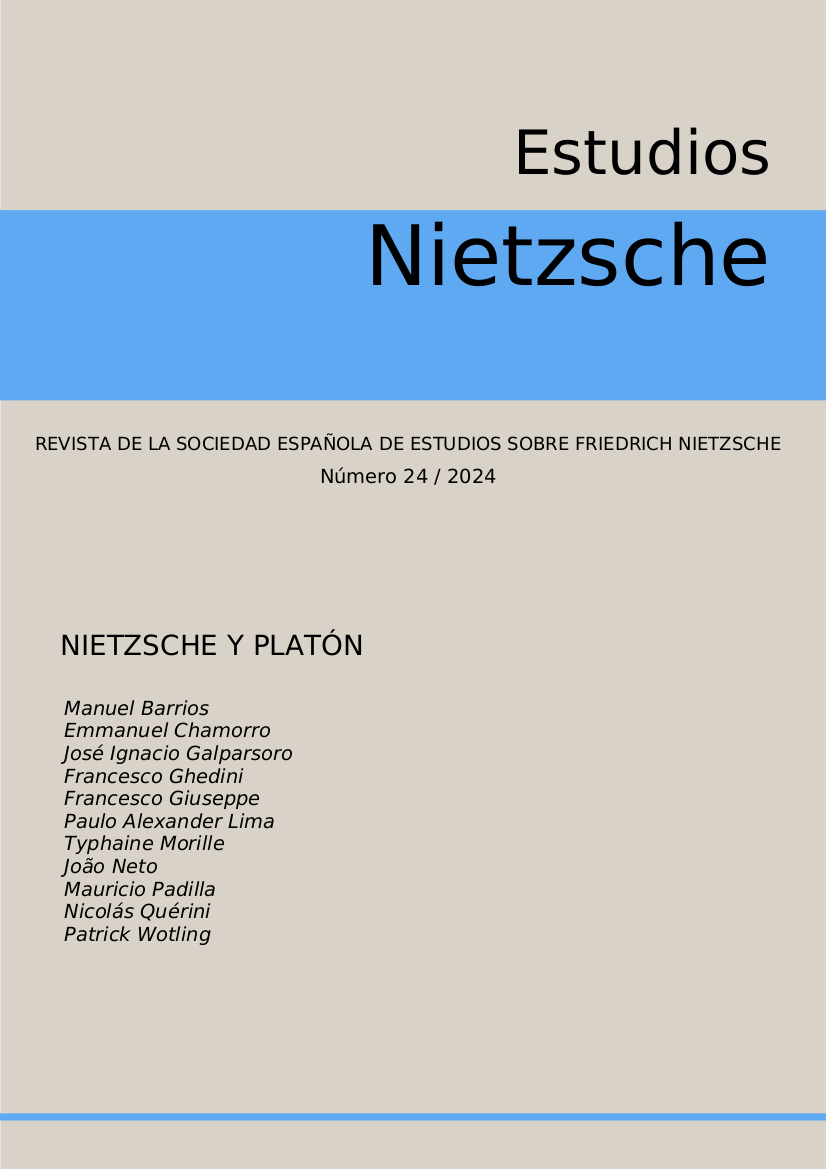A genealogical analysis of Plato's Timaeus and its repercussions on Western culture: Platonic cosmology as a prelude to the Christian cosmology
DOI:
https://doi.org/10.24310/en.24.2024.18079Keywords:
genealogy, cosmology, Timeo, PlatoAbstract
Not few are the passages in which Nietzsche maintains the thesis that Platonic thought acted as a disseminating agent of decadence in the process of forming Western civilization. In fact, the philosopher understands that there would be a kind of "kinship" between Platonism and Christianity. However, where would this "parental" affinity between the two traditions be located? And in what way, precisely, would this line of continuity be characterized? This article aims to answer these questions through a genealogical examination of the Timaeus, a dialogue in which Plato presents a cosmogonic myth that would deeply mark Western worldview.
Downloads
Metrics
References
Agostinho, Santo. Confissões. Trad. de M. L. Jardim Amarante. São Paulo: Paulus, 1997.
__________. A verdadeira religião. Trad. de N. de A. Oliveira. São Paulo: Paulus, 2002.
Boehner, Philotheus; Gilson, Etienne. História da Filosofia Cristã (Desde as origens até Nicolau de Cusa). Trad. de R. Vier Petrópolis: Vozes, 2003.
Bolzani Filho, Roberto. Introdução. In. PLATÃO, A República. São Paulo: Martins Fontes, 2006.
Brisson, Luc. Cosmologia. In. CORNELLI, Gabriele; LOPES, Rodolfo. Platão (Coimbra Companions). São Paulo: Paulus; Coimbra: imprensa da Universidade de Coimbra, 2018.
Carone, Gabriela Roxana. A cosmologia de Platão e suas dimensões éticas. São Paulo: Loyola, 2008.
Dixsaut, Monique. Platão e a questão da alma. São Paulo: Paulus, 2017.
________. Platon-Nietzsche : L’autre manière de philosopher. Paris: Fayard, 2015.
Eusébio de Cesareia. História Eclesiástica. Trad. de Monjas Mosteiro de Cristo. São Paulo: Paulus, 2000.
Filon de Alexandria. Questões sobre o Gênesis. Trad. de G. F. Araújo. São Paulo: Filocalia, 2013.
Marton, Scarlett. Nietzsche: das forças cósmicas aos valores humanos. Belo Horizonte: UFMG, 2010.
Melo Neto, João Evangelista Tude de. Nietzsche à luz dos antigos: a transvaloração dos valores. Curitiba: CRV, 2022.
Merker, Anne. Présentation. In: NIETZSCHE, Friedrich. Écrits philologiques, vol. VIII: Platon. Paris: Belles Lettres, 2019.
Mesquita, António Pedro. Doutrinas não-escritas. In. CORNELLI, Gabriele; LOPES, Rodolfo. Platão (Coimbra Companions). São Paulo: Paulus; Coimbra: imprensa da Universidade de Coimbra, 2018.
Nietzsche, Friedrich. Werke. Kritische Gesamtausgabe (KGW). Berlim/New York: Walter de Gruyter, 1967-1978.
_______. Werke. Kritische Studienausgabe (KSA). Berlim/New York: Walter de Gruyter, 1999.
Nietzsche, Friedrich. Obras completas. Volumen II, Escritos Filológicos. Madrid: Tecnos, 2013.
Orígenes, Tratado sobre os princípios. Trad. de J. E. P. B. Lupi. São Paulo: Paulus, 2012.
Platão. A República. Trad. de M. H. R. Pereira. Lisboa: Fundação Calouste Gulbenkian, 2008.
_______. Fédon In. Diálogos. Protágoras, Górgias e Fedão. trad. de C. A. Nunes. 2.ed. Belém: EDUFPA, 2002.
________. Timeu. Trad. de M. J. Figueiredo. Lisboa: Instituto Piaget, 2003.
Rubira, Luis. Nietzsche: do eterno retorno do mesmo à transvaloração de todos os valores. São Paulo: Discurso: Barcarola, 2010.
Santos, José Trindade. O problema do mal. In: PLATÃO. Timeu. Lisboa: Instituto Piaget, 2003.
Downloads
Published
How to Cite
Issue
Section
License
Copyright (c) 2024 João Neto

This work is licensed under a Creative Commons Attribution-NonCommercial-ShareAlike 4.0 International License.
As of issue 21 (2021) this journal is published only in open access (diamond route).
From that number 21, like the previous numbers published in NIETZSCHE STUDIES, they are subject to the Creative Commons Acknowledgment-NoComercia-ShareIgual 4.0 license, the full text of which can be consulted at <http://creativecommons.org/licenses/by-nc-sa/4.0 >
It is the responsibility of the authors to obtain the necessary permissions of the images that are subject to copyright.
This work is licensed under a Creative Commons Attribution-NonCommercial-ShareAlike 4.0 International License.
Copyright generates two different rights: moral rights and patrimonial rights that EJFB recognizes and respects. Moral rights are those relating to the recognition of the authorship. They are rights of a personal nature that are perpetual, inalienable, unseizable and imprescriptible as consequence of the indivisible union of the author and his/her work.
Patrimonial rights are those that can be derived from the reproduction, distribution, adaptation or communication of the work, among others.







11.png)
